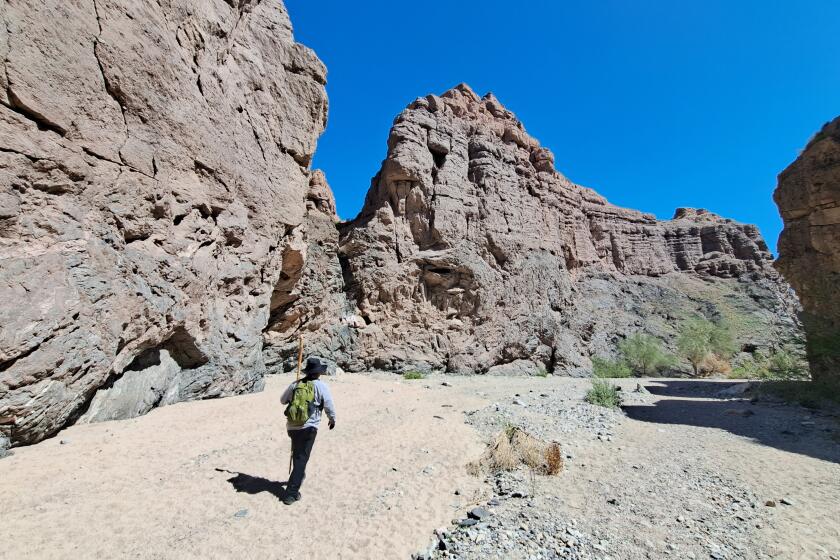Unclogging the path to a plastic bag solution
It was business as usual last week at Huntington Park’s Crown Poly Inc., where workers in the brightly lit factory scurried around large, loud machines churning out hundreds of thousands of clear plastic bags per hour.
But all that could change if the Los Angeles City Council has its way.
A day before I visited Crown Poly, the council had voted to ban plastic bags at supermarkets and stores citywide by 2010. The city’s ordinance will be enacted if the state fails to impose a pending 25-cent-per-bag charge on shoppers who request plastic over paper.
“Plastic bags are a big problem,” said Councilman Ed Reyes, who proposed the ban. “You see them on sidewalks and in gutters, clogging up the storm drains, floating in the river and ocean.”
L.A. consumers use an estimated 2.3 billion plastic bags each year. Statewide, 19 billion plastic bags are doled out by retailers annually. Yet only about 5% end up being recycled, even though, in Los Angeles at least, all you have to do is put them in your blue recycling bin.
The plastic bag industry sued Los Angeles County this month over a plan for retailers to voluntarily reduce the number of plastic bags in circulation by 30% as of 2010 and by 65% three years later. If the goals aren’t met, county officials could implement an all-out ban on plastic bags.
The industry also launched a website -- SaveThePlasticBag.com -- challenging what it calls “myths and misinformation” surrounding bag use.
“Why pick on plastic bags?” asked Stephen Joseph, a lawyer representing the industry. “They’re one of the least harmful things known to mankind.”
He also took this newspaper to task for describing plastic bags in an editorial last week as “an environmental atrocity.”
“When I hear words like ‘environmental atrocity,’ I think of Love Canal or Chernobyl,” Joseph said. “Not plastic bags.”
Clearly he needs to spend a little more time at Compton Creek or the Los Angeles River. Both waterways are choked at times with plastic bags.
But the issue is indeed more complex than pro- and anti-bag forces make out.
At Crown Poly, the nation’s leading maker of plastic produce bags and a growing manufacturer of carryout bags, machine operator Eric Gutierrez, 27, said he didn’t know what would happen if the L.A. bag ban took effect. He figures at least some of the company’s 245 jobs could be eliminated.
“I see a future for me here,” Gutierrez said amid the steady roar of machinery. “I’m worried about that now.”
Elicia Ortiz, 41, the factory’s quality control inspector, echoed this sentiment.
“I’m a single mom,” she said. “Everyone who is against plastic bags should consider all the people who depend on this for a living.”
That’s certainly one aspect of the issue that merits more attention. Another is the feasibility of banning plastic bags.
I consider myself to be as green-minded as the next guy. But, like many people, I routinely ask for plastic bags at the supermarket so I can reuse them as garbage bags, lunch bags and all-purpose storage bags. More than a few dog owners, meanwhile, rely on plastic bags for, well, you know.
I’m aware that I should tote my own canvas bag to the supermarket, but this isn’t always possible. And am I supposed to start purchasing separate plastic bags for garbage? That doesn’t strike me as the most environmentally (or economically) friendly solution.
San Francisco banned plastic bags in November. Many shoppers promptly switched to canvas. Many others, though, simply settled for paper bags at the checkout stand.
Paper bags may not present the same disposal problems as plastic, and they’re easier to recycle, but they’re not exactly a boon to the environment. Paper bags require more energy to produce and, because they’re heavier, are more expensive to transport.
Also, they just won’t do as garbage pail liners, unless you like things messy.
On the other hand, plastic bags pose a danger to marine life, and that’s something that should concern us all. The plastic bag industry is fond of saying there’s no evidence to support this contention, but that’s just silly.
There’s nothing natural about plastic bags in rivers and oceans. It seems ridiculous to think that birds, fish, turtles and the rest can safely coexist with these polyethylene invasions of their habitats.
The answer, I think, is to aim for elimination of plastic bags, but to get there via a transitional step of first introducing more efficient bags. The folks at Crown Poly are already thinking along these lines.
The company has developed what it calls the Hippo Sak. It costs about twice as much to produce as a typical plastic bag, but it’s bigger and stronger. That means stores could actually save money by loading more stuff into a single bag and no longer needing to double- or even triple-bag groceries.
Because of its size and durability, the Hippo Sak also makes for an even better garbage bag at home.
I tested one of the bags at the factory. It was crammed full of heavy cans and didn’t rip or break when I hefted it about.
“The bags go from the store to your trunk, then to your garbage and then to a landfill,” said Cathy Browne, Crown Poly’s general manager. “We think this can greatly reduce litter.”
Perhaps. If nothing else, the hardier bags are a more sensible way of using plastic until consumers grow comfortable with the notion of not using plastic at all.
“When we tried to tell the L.A. politicians about this,” Browne said, “they didn’t even listen.”
If so, that was a mistake. Clearly we need to rethink our convenience-centric, throwaway culture and come up with consumer and business practices that pay more respect to our surroundings.
And if part of the solution comes from a company in the L.A. area, where plastic bags are indeed an environmental atrocity, so much the better.
--
Consumer Confidential runs Wednesdays and Sundays. Send your tips or feedback to david.lazarus@latimes.com.
More to Read
Start your day right
Sign up for Essential California for news, features and recommendations from the L.A. Times and beyond in your inbox six days a week.
You may occasionally receive promotional content from the Los Angeles Times.







